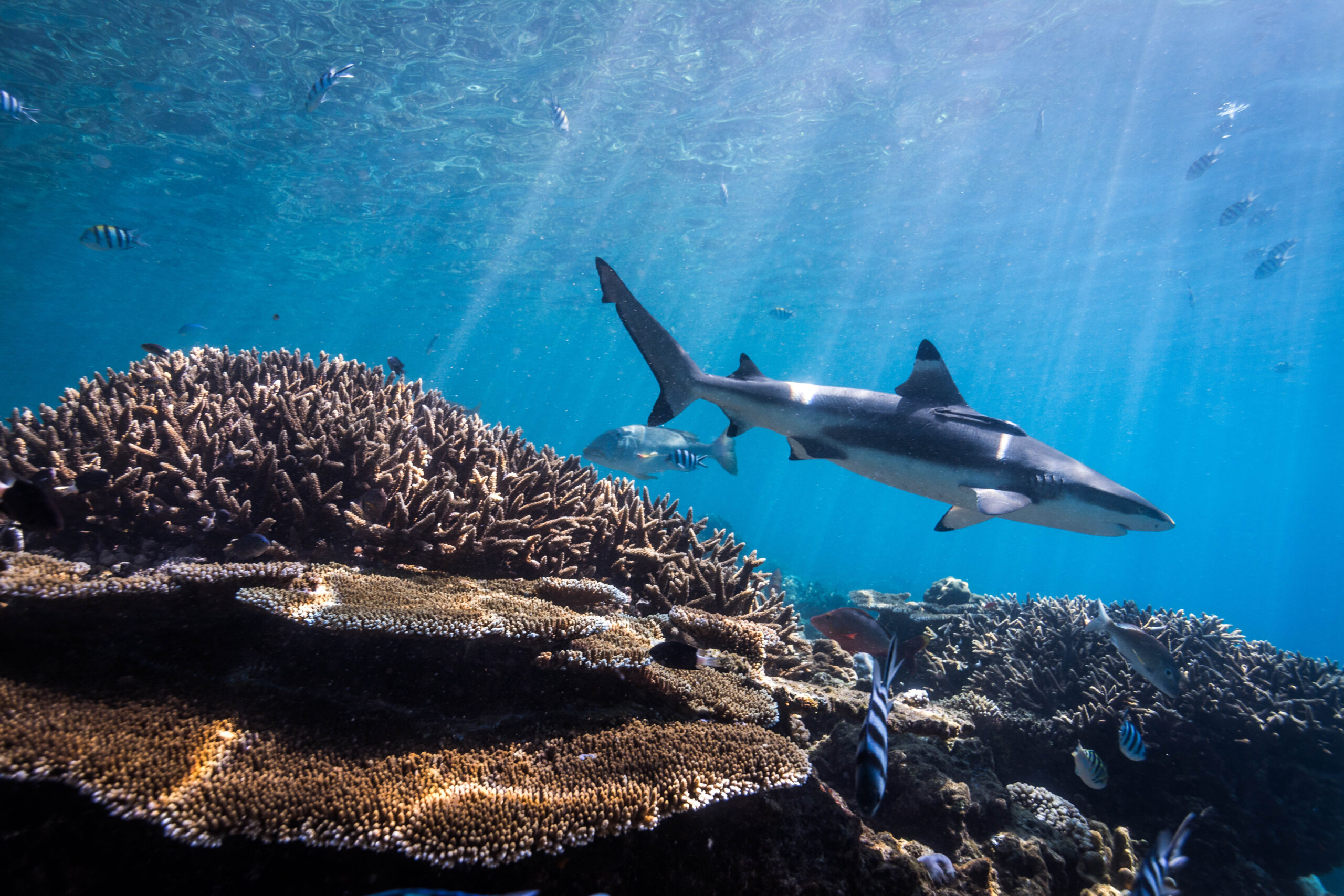Boosting Marine Conservation Efforts Through Improving Community Health
Location
Velondriake, southwest Madagascar
The challenge
Many developing countries are facing challenges of poor health, unmet family needs, gender inequity, food insecurity, environmental degradation and vulnerability to climate change. One such country is Madagascar, where 78% of the population lives on less than $1.90 per day, as estimated by the World Bank in 2019. Along its southwest coastline is the Grand Recif de Tulear, a 450 km barrier reef on which approximately 80% of these communities depend for their livelihoods and food security. Semi-nomadic fishing communities along the southwest coast are some of the poorest and most isolated in the country; almost wholly reliant on the marine environment for food, income, transport and cultural identity. In recent years they have observed declining fish catches, largely owing to pressure related to market-driven exploitation, as well as increasing subsistence demands from a growing coastal population.
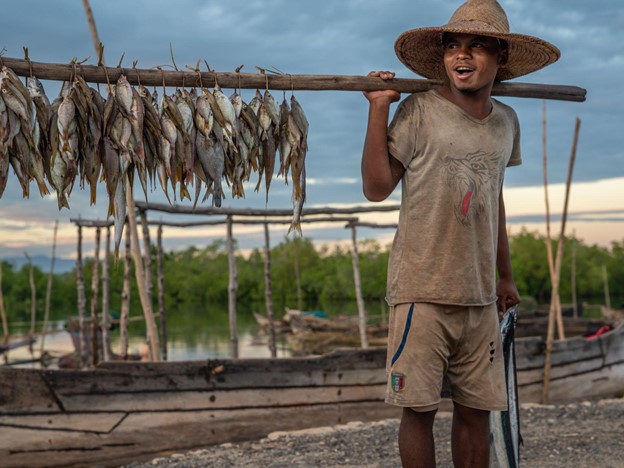
A small-scale fisher from the Vezo community with his catch. Photo © Leah Glass/Blue Ventures
Population growth among these communities is high. Results from the latest community mapping exercise carried out by Blue Ventures in Velondriake show the population increased by 28.3% within a span of 6 years (2015-2021), with women giving birth to an average of 4.5 children. This has continued to place increasing pressure on traditional livelihoods that are dependent on limited marine resources. When Blue Ventures started integrating health in the region in 2007, only 10% of women were using a modern method of contraception. Quite apart from this, poor health was limiting communities’ ability to engage in marine resource management.
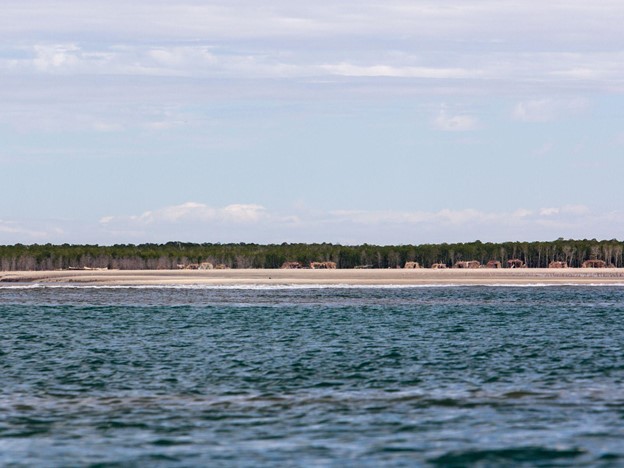
Vezo migrant fishers’ dwellings on a beach in Barren Isles in Madagascar. Photo © Garth Cripps/Blue Ventures
Actions taken
In an effort to protect marine biodiversity and sustain traditional fisheries along the southwest Madagascan coast, Blue Ventures, an international nongovernmental organization, is working with local communities to establish locally managed marine areas (LMMAs). These are networks encompassing temporary fishery closures and permanent marine reserves. 683 km² of marine, coastal, and terrestrial area is covered by the LMMA, serving about 5,051 people. They decided to call this LMMA ‘Velondriake’, which means ‘to live with the sea’.
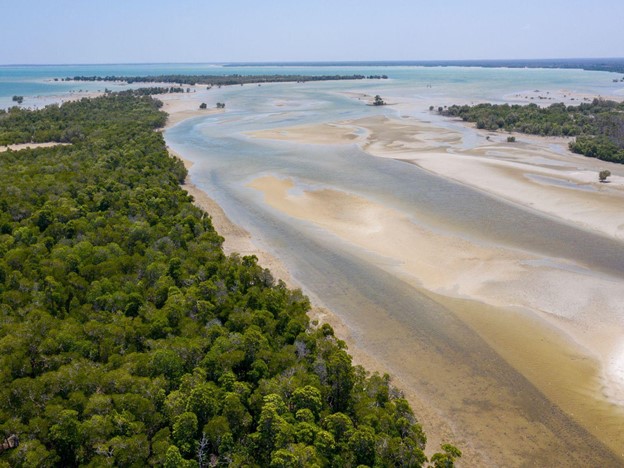
An aerial photo of Vatoavo that is part of the Velondriake locally managed marine area that is managed under Tahiry Honko. Photo © Blue Ventures
Customary laws called dina, that are formally recognized by the government, have been created and are enforced by the Velondriake communities in order to prohibit destructive fishing practices and safeguard certain areas for permanent protection. These were agreed upon and are reviewed by local stakeholders through community meetings attended by representatives elected from each village.
In direct response to the unmet health needs of these communities, Blue Ventures has integrated community-based health services and health promotion into its program of activities.
It was also clear that alternative income sources were needed to reduce fishing pressure. Community-based aquaculture, incorporating seaweed and sea cucumber farming, was therefore established with private sector partners, in order to provide coastal communities with a viable, alternative means of income generation.
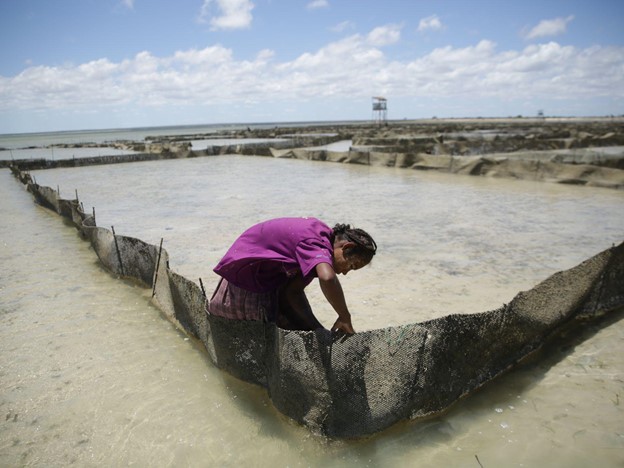
tending to her sea cucumber patch in Tampolove in Madagascar. Photo © Gabriel Diamond/Blue Ventures
Together, these initiatives combined to form a holistic and integrated health-environment (H-E) approach to conservation that reflects the inextricable links between humans, their health, and the environment. This H-E approach aims to improve access to community health services, empower couples to plan and better provide for their families, improve food security, and boost local conservation efforts by broadening and strengthening community engagement in marine resource management.
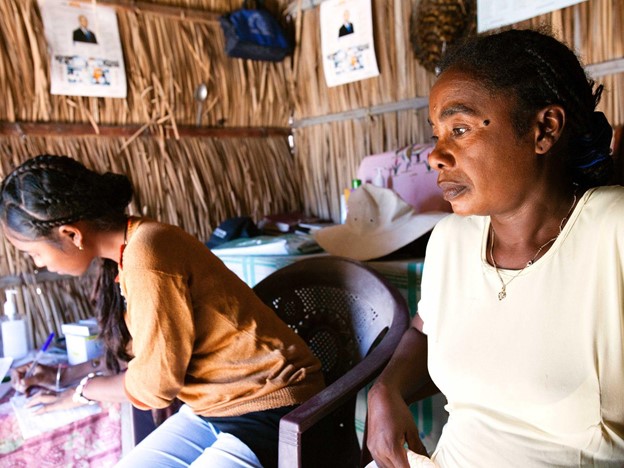
A community member having a session with a community health worker in the community clinic at Antsepoke, southwest Madagascar. Photo © Garth Cripps/Blue Ventures
After the initial introduction of Blue Ventures’ first clinic in the village of Andavadoaka in 2007, which started by providing family planning (FP) services, it quickly became apparent that demand for these services throughout the Velondriake area was great. In order to scale up service delivery, local women were trained as community-based distributors of contraceptives, and today Blue Ventures provides health services across 50 villages in and around the Velondriake LMMA. In addition to family planning services, communities can now access a full range of sexual and reproductive health services, maternal and child health care, and safe water initiatives. In addition, health promotion activities are integrated into Blue Ventures’ community education and outreach activities, to promote the adoption of healthier behaviors.
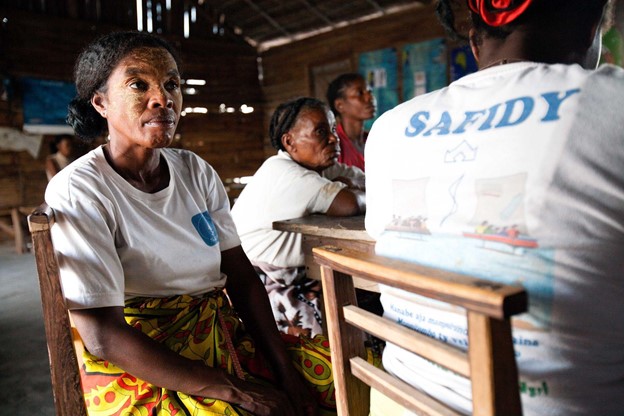
Women attend a community health and midwife training run under the Safidy Program in Madagascar. Photo © Garth Cripps/Blue Ventures
Enabling communities to respond to shocks and stressors
Ultimately, an integrated H-E approach strengthens communities’ response to various climate-related shocks and stressors. Fishing communities are some of the most adversely affected by the climate crisis. In southwest Madagascar, this is characterized by extreme weather events such as hurricanes and cyclones which threaten the safety of the communities; damaging their infrastructure, exposing them to disease and therefore interfering with their ability to fish. Addressing the unmet health needs of these communities contributes towards improved community health outcomes. Research has shown that healthy communities are more resilient and are better able to withstand climate related shocks, both physically and mentally. In addition, better health enables individuals to engage in other social and economic activities needed for them to sustain their livelihoods therefore strengthening economic and social resilience.
How successful has it been?
Since Blue Ventures began providing FP services in Velondriake in 2007, there has been a consistent increase in the uptake of family planning services. The proportion of women of reproductive age using contraceptives has increased from 10% in 2007 to 55% in 2018. The general fertility rate has halved during the same period. In addition, the integrated approach has contributed to better maternal and child health outcomes. For instance, breastfeeding duration increased six-fold while immunization uptake also improved.
As a result of women being able to plan their families and having better health outcomes, they are better able to engage in income generation. Women using Blue Ventures’ community health services are earning twice as much money as women who are not, with evidence to suggest that these women are demonstrating longer term thinking. Communities describe feeling more empowered and better able to look after and provide for their families. Anecdotal reports also suggest that communities feel more trusting of Blue Ventures, a crucial ingredient for working in partnership towards shared conservation goals.
Research has also shown that healthy, engaged communities are better able to effectively utilize their natural resources thus contributing towards sustainable natural resource management.
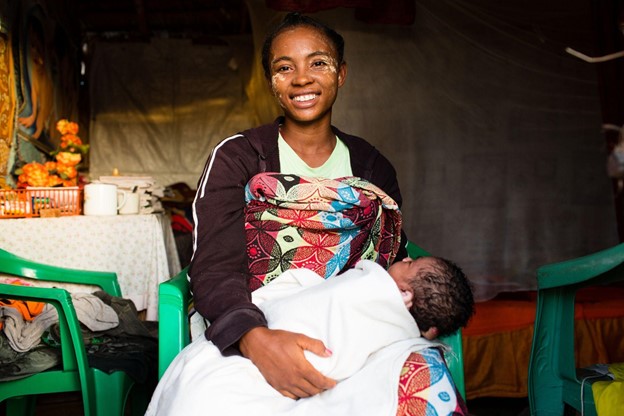
A Vezo mother and her child from the Andavadoaka community who are part of the Safidy Program. Photo © Garth Cripps/Blue Ventures
Lessons learned and recommendations
Working holistically
Blue Ventures’ integrated, holistic and rights-based approach to marine conservation is an efficient way of fostering community engagement while responding to their most urgent socio-economic needs thus enabling them to sustainably manage their natural resources. Addressing the various interconnected needs such as health, livelihoods, gender issues, vulnerability to climate change and others allows for optimizing impact which can be felt in decades to come. It is therefore important to appreciate the interconnected nature of human needs and how addressing them in an integrated manner can contribute to better community outcomes and impact as opposed to addressing them in silos or individual programs.
The H-E approach can foster greater community resilience
One of the key aspects of a H-E approach is increasing access to quality health services. Many of the communities living within highly biodiverse areas are marginalized and lack access to basic health services, denying them this crucial basic human right. Poor health limits individuals’ and communities’ ability to efficiently manage their natural resources and their ability to maximize on livelihood opportunities. In addition, when hit by adverse environmental or health events such as cyclones or the most recent COVID-19 pandemic, communities experiencing poor health may not be able to respond as effectively. This further reinforces the need for health interventions to be incorporated within conservation programs in order to ensure communities are better able to respond to shocks and stressors.
The H-E approach can support the empowerment of women and girls
Increasing access to voluntary family planning in the Velondriake region gave women the autonomy to make decisions about the spacing and number of children they would like to have, with positive add-on effects relating to their ability to engage in other aspects of community life.
Partnerships to increase reach
To widen its scope and reach more communities, Blue Ventures has been collaborating with various partners, including the Government of Madagascar and other organizations working in marine conservation and health. This has enabled the organizations to reach these communities with services, enabling Blue Ventures to replicate the LMMA and H-E models, reaching about 50 villages in the southwestern region.
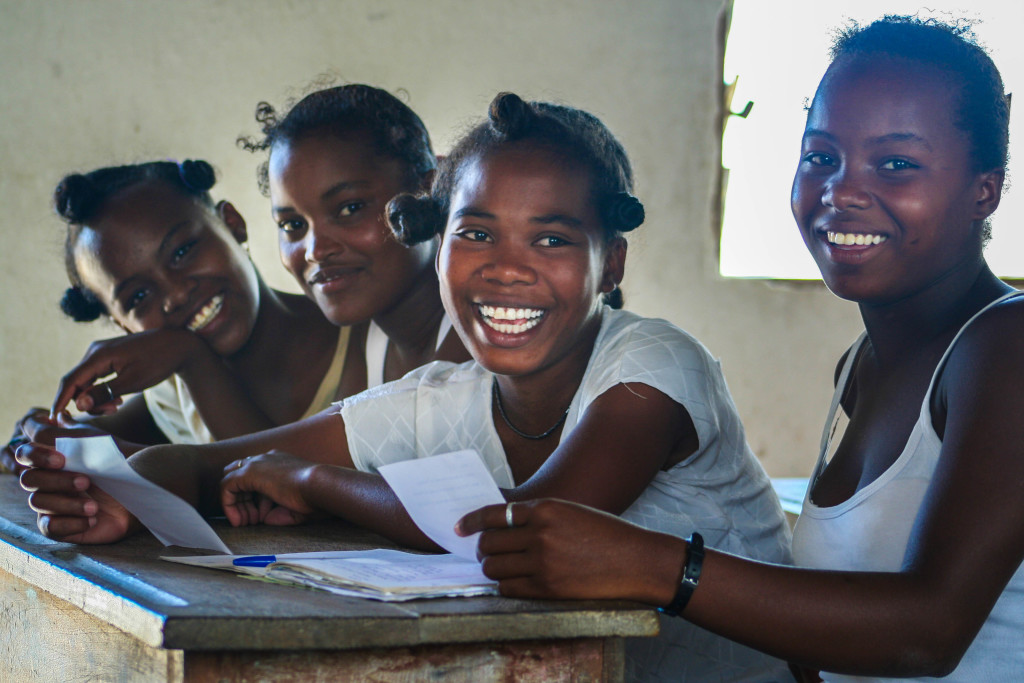
Providing girls with reproductive choices allows them to delay their first pregnancy until after they have completed their education. Photo © Ida Vincent
Funding summary
MacArthur Foundation
Helmsley Charitable Trust
UNFPA Madagascar
USAID
Lead organizations
Partners
Marie Stopes International
Population Services International
MAHEFA
Ministry of Public Health in Madagascar
John Snow, Inc. (JSI)
USAID ACCESS Program
Project Jeunes Leaders (PJL)
Resources
Dr. Vik Mohan, BV’s Director of Community Health, TEDx talk
Recent research findings on H-E
BV’s ten year community health retrospective
Irene’s story powerfully describing the impact of BV’s Community Health Programme




